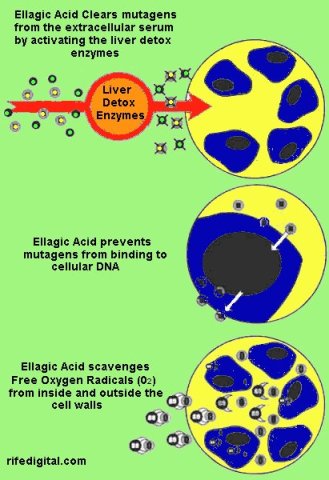Ellagic acid is a naturally occurring fat soluble antioxidant found in raspberries, blackberries, strawberries, walnuts, pomegranates and the Muscadine Grape. The Muscadine grape is the only grape that contains Ellagic acid. Ellagic acid has antioxidant activity, free radical scavenging  capability, and anti-inflammatory activity. Researchers are interested in Ellagic acid because of its potential to effect the 3 mechanisms shown in this picture.
capability, and anti-inflammatory activity. Researchers are interested in Ellagic acid because of its potential to effect the 3 mechanisms shown in this picture.
1. Researchers found that daily consumption of foods high in ellagic acid activates powerful detoxifying enzymes in the liver. These enzymes promote a cleansing of the blood and protection and regeneration of liver cells.*
2. Ellagic acid prevents carcinogens and mutagens from binding to cellular DNA and because of its chemical structure, it may also inactivate many carcinogens.*
3. Works as a powerful antioxidant to stabilize and prevent the formation of oxygen free radicals both inside and outside the cell wall.*
Dr. Daniel Nixon, a pioneer in cancer prevention research at the Hollings Cancer Institute at the Medical University of South Carolina has done extensive research into Ellagic acid. Preliminary evidence generated by his team suggests that Ellagic acid may promote a programmed normal cell death (called apoptosis) of certain pre-cancerous and cancerous cells and stimulate the immune system to destroy other abnormal cells. Dr. Nixon’s team also found that Ellagic acid prevents the destruction of a cellular regulatory gene called P53 a tumor suppressor protein.*
In the 4 mechanisms that Vivix fights cellular aging, ellagic acid impacts 3 of the 4. It protects and repairs cellular DNA, positively impacts genetic regulators, and because of its anti-inflammatory properties, it slows AGE protein formation. As you can see, there is a lot more to the Muscadine Grape than just Resveratrol, but that’s another topic.
* See Disclaimer Page
References:
1. Mertens-Talcott SU, Lee JH, Percival SS, Talcott ST. Induction of cell death in Caco-2 human colon carcinoma cell by ellagic acid rich fractions from muscadine grapes (Vita rotundifolia) J Agric Food Chem 2006 Jul 26; 54(15):5336-43.
2. Barch DH, Rundhaugen LM, Stoner GD, et al. Structure-function relationships of dietary anticarcinogen ellagic acid. Carcinogenesis 1996;17:265-9.
3. Constantinou A, Stoner GD, Mehta R, et al. The dietary anticancer agent ellagic acid is a potent inhibitor of DNA topoisomerases in vitro. Nutr Cancer 1995;23:121-30.
4. Priyadarsini KI, Khopde SM, Kumar SS, Mohan H. Free radical studies of ellagic acid, a natural phenolic. J Agric Food Chem 2002;50:2200-6.